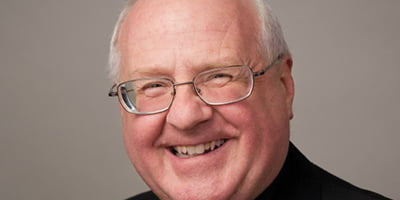
Father Mark Goldasich is the pastor of Sacred Heart parish in Tonganoxie. he has been editor of the Leaven since 1989.
by Father Mark Goldasich
Just a reminder, folks, this coming Sunday, after the 10:30 Mass, we’ll have gas.”
This is one of my favorite announcements to make in church. It never fails to get a chuckle from the congregation. (And I suppose it proves, yet again, that it really doesn’t take much to amuse me.)
The “gas” that is being announced is actually GAS — an acronym for “Get Ac- quainted Sunday.” The name originated with our present parish council president and his wife. GAS is a simple way for “old” parishioners to reach out and welcome new parishioners.
Newcomers receive a letter inviting them to GAS, then we get together for some refreshments, have representatives from the various parish organizations and ministries let them know what’s available at the parish, and encourage newcomers to get involved. Afterwards, our new members tell us a little about themselves. Before leaving, we give them a small gift of welcome, a pictorial directory of the parish, and a handout entitled “Everything You Wanted to Know About Sacred Heart (But Were Afraid to Ask)” that lists programs, services and contact names for people in the various parish groups.
The whole program usually takes about an hour — a small investment of time that has consistently paid back a huge dividend. Our intention with GAS is to make people feel part of our family of faith — not just an anonymous face or number. It’s a way to be, as the old- fashioned word says, “neighborly.”
We just had GAS this past Sunday, anticipating by one week National Good Neighbor Day, traditionally celebrated on the fourth Sunday in September.
I’ve been fortunate throughout my life to be surrounded by great neighbors, both inside and outside the church. For the first four years of my life, I lived next door to my maternal grandparents and an uncle and, next to them, was the home of my godparents. If you’ve ever been to Strawberry Hill in Kansas City, Kan., you know just how close the hous- es are built to one another. We used to joke that if you didn’t like what was for supper at your house, all you had to do was stretch out your arm, reach through your neighbors’ window, and grab some- thing off of their table. My mom, who still lives on the Hill, continues to enjoy excellent neighbors.
But what makes a neighbor excellent? There are several qualities in my book.
First is friendliness. This can be as simple as taking a few seconds to wave at a neighbor when you see them. Getting to know their name is an added bonus. Spending time chatting occasionally in the driveway or at the mailbox builds even more bridges.
Second is availability. Offering to be of service to a neighbor in some way takes friendliness a step further. For instance, letting neighbors without a basement know that they are welcome to come to yours during treacherous weather can be a huge comfort, whether they take you up on that or not. Or offer- ing to pick up something at the store for a neighbor while you’re out running er- rands is another wonderful gesture.
Anticipating the needs of neighbors is an even better thing. Shoveling your neighbor’s walk or scraping off their car windows in the winter — without them asking — is a much-appreciated service.
Third, and maybe most critical, is respect. There’s a fine line between being helpful and being intrusive. While it’s beneficial to establish ties with neighbors, it’s equally important to give people “space,” to not smother others with attention every time they open their door or come outside.
Perhaps what makes a good neighbor is best summarized in this ancient Jewish tale that Jesus might have heard while he was growing up:
There once was a gentile who ap- proached the Rabbi Shammai and said that he’d like to learn more about Judaism. Unfortunately, because he couldn’t stay long in Jerusalem, he asked Shammai, “Can you teach me the whole Torah while I am standing on one foot?”
Shammai grew angry and sent the man away. The gentile next came upon Rabbi Hillel and asked him the same question. Hillel welcomed the man and told him, “Whatever is hateful to thee, do not do to thy fellowman. This is the whole Torah; all the rest is commentary. Now go and study.” (Adapted from an entry in Anthony Castle’s “More Quips, Quotes & Anecdotes for Preachers and Teachers.”)
Yes, being a good neighbor can be summarized by asking: How would I want to be treated?
One of the saddest stories to hear is of a person who has fallen or died in their home . . . and no one discovers them for days or weeks. Where were their neighbors? Did no one care enough to even notice their absence?
Especially on this upcoming National Good Neighbor Day, if asked whether people in our parish or neighbor are ig- nored and neglected, let’s answer with confidence and commitment: NIMBY! (Not In My Back Yard!)


